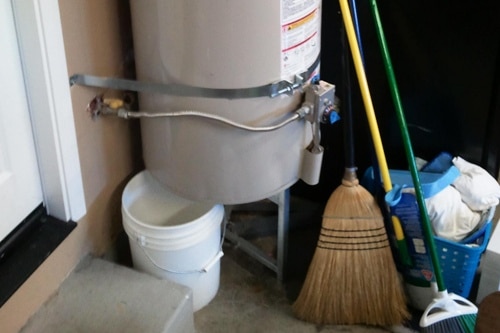When is the last time you paid attention to your water heater? It is easy to ignore as long as you keep getting hot water when you need it. Gas and electric water heaters are some of the most dependable appliances in our home. However, you still need to maintain your water heater if you want it to last for as long as possible and operate at optimum efficiency. Light maintenance should be done a few times per year.
Maintaining your water heater is easy and inexpensive. By doing the following steps you can significantly improve its longevity and operating efficiency:
- Flush sediments from your water heater. Over time your water heater can get sediments in it and become less effective. Therefore, you need to drain it about twice per year by placing a bucket under the overflow pipe and opening the valve. Be careful because the water is scalding hot. This is a mini flush and doesn’t drain the entire tank. Although full tank draining is best, performing a full flush is a bit of work and requires shutting down the water heater.
- Verify you don’t have any rust in the tank. You can verify this by looking at the water as you flush out sediments. You could have a problem if you see rust coloration, flakes or rust in the water. Also, look inside the burner chamber of your water heater to see if there are any flakes of rust inside of the chamber. If you notice a problem, the anode rod might need to be replaced.
- Check the pilot light if you have a gas water heater. The flame should be blue and steady with no signs of yellow in it. If you see a yellow color, this may mean that the jets need to be cleaned.
- Make sure the flue pipe is draining air properly if you have a gas water heater. You can do this by lighting a match next to the bell housing and watching the smoke. The smoke should go up the flue pipe.
- Verify your temperature setting is correct. Your settings should be around 110 degrees to 120 degrees Fahrenheit to avoid overheating and reduce the energy used to heat the water. Adjust the temperature if it is set too high.
- Test the temperature and pressure relief valve. This is at the top of the tank. Lift up on the valve partway to let some water into the drain tube. Let go and let the valve snap back. You should hear a gurgling sound when the valve releases the water. If nothing happens your valve needs to be replaced.
- Listen for unusual sounds. It’s typical for you to hear the sound of boiling water. Excessive buildup of sediment in the bottom of the tank could result in overheating and boiling of water. However, if you flush out the sediments and you still hear a low rumbling or popping noise, you could have a problem with overheating.
- Verify you don’t have any small leaks. Tightening your thread connections with a wrench might correct leaking problems but don’t over tighten. Leaks coming from a heating element on an electric water heater could be the result of loose mounting bolts. With the water and power turned off, try to tighten the heating element mounting bolts. Make sure they are snug and again, do not over-tighten.
If you have rust in your tank, your tank is overheating or leaking, or you have other problems, it is time to call your plumber. High Priority Plumbing can repair or replace your hot water heater. Call us for more information at 770.860.8110 in Atlanta.
